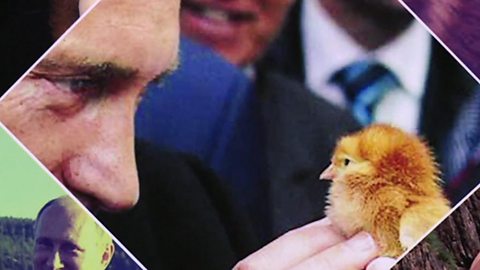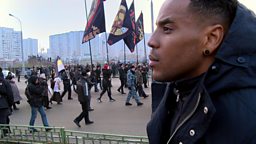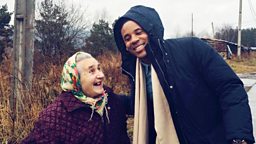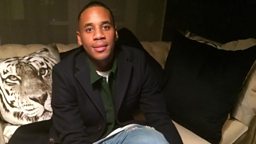Reggie Yates: "The opportunity to challenge myself in another corner of the world was one I couldn't turn down"
Reggie Yates writes about his unbelievable experiences meeting the Russian nationalists for his new series, Reggie Yates' Extreme Russia.
Off the back of my telling the story of what it is to be young and South African across three episodes, the opportunity to challenge myself yet again in another corner of the world I'd yet to visit was a one I couldn’t turn down.
Coming face to face with some of the unavoidable issues in South Africa such as poverty and the palpable apartheid hang ups made the experience tough at times, but the advantage of sharing a first language and not feeling entirely alien wherever I went made for some brilliant moments of light both on and off camera.
Jumping from being a member of the majority in my African exploits to continuously being the only black face in a room full of Russian nationalists while filming this series made for some incredibly uncomfortable situations, but challenging and eye-opening ones nonetheless.

"Can you explain the pictures of Putin with the animals?"
Reggie meets a group of nationalists who promote a positive image of Putin.
My journey began on a nationalist march along side a few thousand young Russian men and women vocalising their distaste with the current immigration situation and generally the direction they feel the country is headed.
Between monkey chants and a constant diatribe of derogatory comments from the braver vocal few, the feeling at no point was fear; it was desolation.
To see so many young people en masse vomiting ignorance in a time when there really is no excuse to not culturally self educate via the amazing tool that is the internet left me sullen. Being that this was the beginning of my time in Russia, things unfortunately didn’t get much better as I further embedded myself within the ranks of two very different nationalist organisations.
Dmitry Demushkin, leader of the Slavic Union, is a force to be reckoned with. Guiding a growing group of young men and women in both their belief system and (believe it or not) expertise in self-defence - predominantly with knives - has gained him both cult and father figure status among his followers.
Attending the packed weekly knife club put into perspective just how potent the blurring of traditional Russian values and political standpoint have become in the world of Demuskin and his supporters.
The desire to carry a large knife and learn how to use it by all attendees was explained away as being traditional. Strength, protecting one’s family and as a result, learning some form of self-defence are apparently very Russian traits.
Between my first hand experience of the march and the level of combat instruction, this desire to carry and use knives In the context of the ‘Russia for Russians’ Slavic Union mandate can only but increase the chances of conflict with immigrants.
Hearing harrowing tales of violent knife attacks by young nationalists on immigrant victims and gaining a broader picture of the growing trend to join such organisations further confirmed my suspicions that being young and Russian is challenging in more ways than the word cap placed upon this article will allow me to cover.
How young Russian national pride manifests can take several forms and to be clear, what I witnessed wasn’t consistently extreme nor by any means threatening in its entirety. The scary thing I found was the pull and growing influence of the groups that are.



